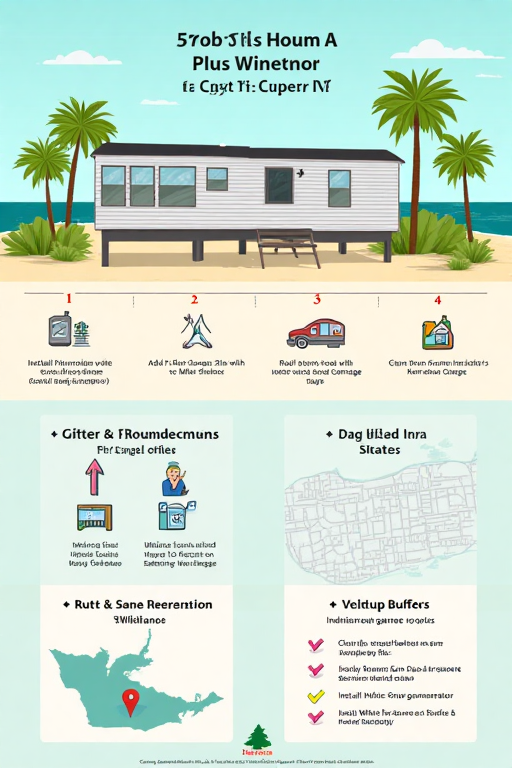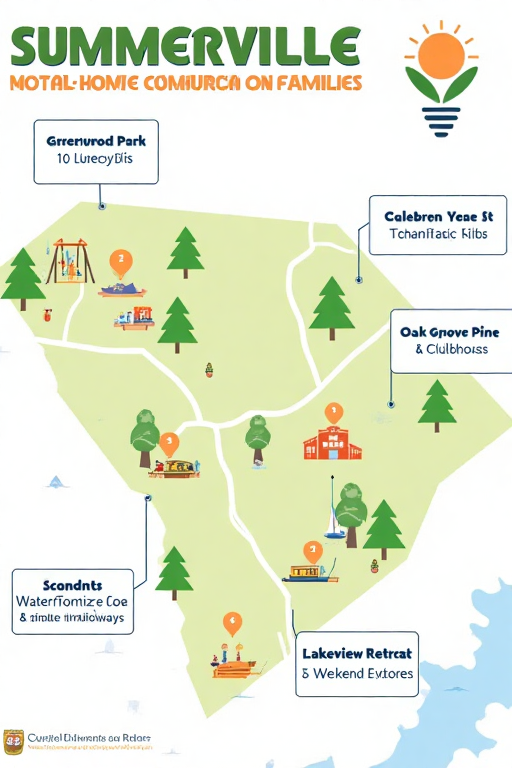How to Negotiate the Best Price When Buying a Mobile Home in South Carolina
Your Comprehensive Guide from Faith Mobile Home Solutions
Introduction
Buying a mobile home in South Carolina can be one of the most rewarding investments you make—if you negotiate the best price possible. In today’s competitive market, knowing how to effectively negotiate can save you thousands of dollars and significantly impact your return on investment. This guide from Faith Mobile Home Solutions is designed to help you navigate every step of the negotiation process, providing you with actionable strategies, in-depth market analysis, and expert legal and financial insights.
In this extensive guide, spanning over 7,000 words, we explore the key elements of negotiation, from understanding the local mobile home market and preparing a negotiation strategy to implementing proven negotiation techniques and handling counteroffers. Whether you are a first-time buyer or an experienced investor, the strategies outlined in this guide will empower you to confidently secure a great deal on your mobile home purchase.
Market Overview: Understanding the South Carolina Mobile Home Market
Before entering any negotiation, it is essential to understand the market conditions. South Carolina’s mobile home market is influenced by factors such as regional demand, local economic conditions, seasonal trends, and the availability of comparable properties. Thorough market research provides you with a solid foundation for making informed decisions and setting realistic price expectations.
Economic Factors & Regional Demand
The affordability and flexibility of mobile homes make them a popular choice in South Carolina. Local economic growth, job opportunities, and demographic trends all contribute to steady demand, which can affect pricing. Buyers should consider factors such as neighborhood safety, proximity to amenities, and future development plans when evaluating market conditions.
Comparative Market Analysis (CMA)
A Comparative Market Analysis (CMA) is a critical tool in your negotiation arsenal. By reviewing recent sales data of similar mobile homes in the area, you can estimate a fair market value. This analysis will help you identify any price discrepancies and use them to your advantage during negotiations.
Seasonal Trends
Seasonal variations can also affect mobile home prices. For example, buying during the off-season may give you leverage to negotiate a lower price. Understanding these trends ensures you approach negotiations at the right time.
Preparation & Research: Laying the Groundwork for Negotiation
Effective negotiation begins long before you sit down at the negotiating table. Preparation and research are crucial to understanding your financial position, the market, and the property’s condition.
Establishing Your Budget
Before negotiating, determine your maximum budget and desired price range. Factor in additional costs such as repairs, upgrades, taxes, and financing fees. Having a clear budget in mind will help you remain focused during negotiations and avoid overpaying.
Gathering Data
Collect all relevant data, including recent sales of similar mobile homes, appraisal reports, and market analyses. This information not only supports your negotiation position but also provides valuable insights into pricing trends in your area.
Assessing the Property
Conduct a thorough inspection of the mobile home. Identify any areas that may require repairs or upgrades, as these can be leveraged during negotiations. Document any issues with photographs and detailed notes, and obtain repair estimates if possible.
Setting Negotiation Objectives
Define clear objectives for your negotiation. Decide on your ideal purchase price, acceptable compromises, and non-negotiable terms. Establishing these objectives in advance will give you confidence and clarity during the negotiation process.
Negotiation Strategies: Techniques to Secure the Best Price
Armed with thorough research and preparation, it’s time to employ effective negotiation strategies. The following techniques can help you achieve a favorable outcome:
Start Low, But Reasonably
Begin negotiations with a lower offer than your target price. This leaves room for upward negotiation while setting a baseline that reflects market data and any identified issues with the property.
Leverage Property Flaws
If your inspection reveals defects or areas needing repair, use these as bargaining chips. Present repair estimates to justify a lower price, and emphasize the costs you will incur after purchase.
Be Prepared to Walk Away
A willingness to walk away from a deal can be a powerful negotiation tactic. This mindset not only demonstrates that you have alternatives but also puts pressure on the seller to reconsider their price.
Use Market Comparables
Present data from your CMA to support your offer. Showing the seller comparable properties that have sold for less can help justify your price and encourage them to adjust their asking price.
Keep Emotions in Check
Negotiations can be stressful, but maintaining a professional and unemotional demeanor is critical. Focus on the facts and let your research guide your decisions, rather than getting swayed by sentiment.
Negotiate on Multiple Terms
Price is not the only negotiable term. Consider negotiating on closing costs, move-in dates, repair credits, or contingencies. A package deal that addresses several aspects can be more attractive than just a lower price.
Follow Up and Stay Engaged
If initial negotiations stall, follow up with the seller. Sometimes a well-timed call or email can reopen discussions and lead to a breakthrough.
Communication Techniques: The Art of Negotiation
Effective communication is at the heart of successful negotiation. Both verbal and non-verbal communication play a role in shaping the negotiation process.
Active Listening
Listen carefully to the seller’s concerns and motivations. Understanding their perspective can help you tailor your negotiation strategy and find mutually acceptable solutions.
Clear and Concise Messaging
Communicate your offers and counteroffers clearly and confidently. Use data and facts to support your position, and avoid emotional language that may cloud the discussion.
Non-Verbal Cues
Pay attention to body language, eye contact, and tone. Positive non-verbal cues can help build trust and create a more collaborative negotiation atmosphere.
Written Communication
Follow up verbal discussions with written summaries. This ensures that both parties have a clear record of the agreed-upon terms and helps prevent misunderstandings.
Mastering communication techniques is essential to ensure that your negotiation is productive and leads to a win-win outcome.
Handling Obstacles and Overcoming Negotiation Challenges
Even with the best preparation and strategies, you may encounter obstacles during negotiations. Here are some common challenges and ways to overcome them:
Dealing with a Stubborn Seller
Some sellers may be reluctant to budge on price. If you encounter resistance, reiterate your research findings and be prepared to walk away if the terms do not meet your requirements.
Counteroffers and Concessions
Expect counteroffers during the negotiation process. Carefully evaluate each counteroffer and determine if concessions, such as closing cost assistance or repair credits, can bridge the gap between your offer and the seller’s asking price.
Managing Time Constraints
Time pressures can force quick decisions. If you feel rushed, request additional time to review the offer or gather more information. Patience is key to making a well-informed decision.
Emotional Reactions
Negotiations can become emotional. Stay focused on the facts, and if necessary, take a break to regain composure before continuing discussions.
By anticipating obstacles and preparing solutions, you can remain in control and steer the negotiation towards a favorable outcome.
Legal Considerations: Protecting Your Interests
Understanding the legal aspects of mobile home transactions is crucial to protect your interests. Negotiations should always be conducted with an awareness of the legal framework surrounding the sale.
Reviewing the Purchase Contract
Carefully review all terms in the purchase contract. Ensure that all negotiated points are included and that contingencies are clearly stated. It is advisable to have a real estate attorney review the contract before you sign.
Understanding Disclosures
Sellers are required to disclose certain information about the mobile home. Familiarize yourself with South Carolina’s disclosure requirements so you can negotiate based on accurate and complete information.
Contingency Clauses
Incorporate contingency clauses that allow you to back out of the deal if critical issues arise during the inspection or appraisal. These clauses protect you financially and legally.
Negotiating Repairs and Credits
Legal documentation of any agreed-upon repairs or seller credits is essential. Ensure that all such agreements are included in the final contract to avoid future disputes.
Legal considerations are an integral part of the negotiation process and ensure that the transaction is fair, transparent, and legally binding.
Case Studies & Real-Life Examples
Learning from real-life examples can provide valuable insights into successful negotiation strategies. Below are a few case studies that illustrate how buyers in South Carolina have secured favorable deals through effective negotiation.
Case Study 1: Leveraging Market Data
A first-time mobile home buyer used detailed market research to identify a property that was slightly overpriced compared to recent comparable sales. By presenting a well-documented CMA, the buyer was able to negotiate a 10% reduction in the asking price.
Case Study 2: Emphasizing Repair Costs
An investor discovered several maintenance issues during the home inspection. Using repair estimates as leverage, they negotiated a repair credit that saved thousands of dollars, effectively lowering the overall purchase cost.
Case Study 3: Combining Multiple Negotiation Points
In another scenario, a buyer negotiated not only on price but also on closing costs and a flexible move-in date. This comprehensive approach resulted in a deal that was well within the buyer’s budget and provided additional financial benefits.
These case studies highlight the importance of preparation, documentation, and a multi-faceted negotiation approach to achieve the best possible price when buying a mobile home.
Expert Tips from Faith Mobile Home Solutions
Drawing on decades of experience in the South Carolina mobile home market, our experts at Faith Mobile Home Solutions have developed key tips to help you negotiate the best price:
Do Your Homework
Gather as much data as possible—market comparables, inspection reports, and appraisal documents. Knowledge is power when negotiating.
Be Prepared to Walk Away
Sometimes, the best negotiating tactic is to be willing to walk away. This mindset often compels sellers to reconsider their positions.
Keep Emotions in Check
Stay focused on the facts and let data drive your decisions. Avoid becoming emotionally attached to any particular property.
Negotiate on Multiple Fronts
Price is important, but so are other terms like closing costs, repair credits, and move-in dates. Consider the entire package when negotiating.
Use Professional Assistance
Consult with a real estate agent and attorney experienced in mobile home transactions. Their expertise can help you navigate complex negotiations and protect your interests.
Follow Up Diligently
After initial negotiations, follow up with the seller. Persistence and clear communication often lead to better deals.
By implementing these expert tips, you’ll be well-equipped to negotiate confidently and secure the best possible price for your mobile home in South Carolina.
Conclusion: Negotiate Smart, Buy Smart
Negotiating the best price when buying a mobile home in South Carolina requires a blend of thorough research, strategic planning, and effective communication. By understanding the local market, preparing detailed documentation, and using proven negotiation tactics, you can secure a deal that maximizes your investment and sets you on the path to long-term success.
From market analysis to legal considerations and expert tips, this guide has provided you with a step-by-step approach to negotiation. Whether you’re a first-time buyer or an experienced investor, the strategies discussed here will help you navigate the negotiation process with confidence and achieve a favorable outcome.
Thank you for choosing Faith Mobile Home Solutions as your trusted resource. We wish you success in your mobile home purchase and a prosperous future built on smart, informed decisions.
Frequently Asked Questions (FAQs)
1. What is the first step in negotiating a mobile home purchase?
Begin by conducting thorough market research and establishing a clear budget and price range.
2. How important is a Comparative Market Analysis (CMA)?
A CMA is essential as it provides data on recent sales of similar properties, which forms the basis of your negotiation.
3. What should I do if the mobile home needs repairs?
Document any required repairs and obtain estimates to use as leverage during negotiations to lower the asking price.
4. How can I determine a fair offer price?
Combine market research, a professional appraisal, and repair estimates to establish a fair and competitive offer.
5. Is it advisable to negotiate closing costs?
Yes, negotiating closing costs can significantly reduce your overall expenses and is a common negotiation tactic.
6. How do I handle a seller’s counteroffer?
Review the counteroffer carefully, compare it to your research, and be prepared to negotiate further or walk away if necessary.
7. What role does timing play in negotiation?
Timing is critical—buying during a slow market or off-season can give you additional leverage to negotiate a lower price.
8. How important is it to remain unemotional during negotiations?
Staying unemotional and focused on the facts helps maintain clarity and prevents you from overpaying due to sentiment.
9. Can I negotiate terms other than price?
Yes, you can negotiate various terms such as closing costs, repair credits, and move-in dates to create a better overall deal.
10. How do I know when to walk away?
If the seller is unwilling to meet your budget or if negotiations stall despite your best efforts, be prepared to walk away and explore other options.
11. What is the best way to research market comparables?
Use online real estate platforms, consult with local agents, and review recent sales data in your area.
12. Should I hire a real estate agent for negotiations?
Working with an experienced agent can provide valuable insights, negotiate on your behalf, and help you secure a better deal.
13. How do repair estimates affect negotiation?
Accurate repair estimates can justify a lower offer by highlighting necessary expenses that the seller should account for.
14. What are some common negotiation mistakes to avoid?
Avoid overpaying, neglecting to do sufficient research, becoming emotional, and failing to get all agreements in writing.
15. How can I improve my credit score before buying?
Pay down debts, make timely payments, and correct any errors on your credit report to improve your credit score and secure better financing terms.
16. What should I include in my negotiation checklist?
Include your budget, market comparables, a list of necessary repairs, target price, and acceptable concessions.
17. How do I evaluate a seller’s motivation?
Ask questions about the property’s history, reasons for selling, and time on the market. A motivated seller may be more open to negotiation.
18. Can I negotiate online or over the phone?
Many negotiations begin online or over the phone, but face-to-face meetings can often yield better results by building rapport and trust.
19. How does a professional appraisal support my negotiation?
An appraisal provides an objective market value that you can use as evidence to justify your offer and negotiate more effectively.
20. What are contingency clauses and why are they important?
Contingency clauses protect you by allowing you to cancel the contract if certain conditions—like a failed inspection—are not met.
21. How can I use negotiation tactics without damaging the relationship with the seller?
Maintain professionalism, use objective data to support your offers, and communicate clearly and respectfully throughout the process.
22. What should I do if negotiations become contentious?
Consider involving a mediator or taking a break from negotiations to reassess the situation calmly before proceeding.
23. Can financing pre-approval strengthen my negotiation position?
Yes, pre-approval demonstrates your seriousness as a buyer and can give you leverage by clarifying your budget.
24. How do I document negotiation agreements?
Always get any verbal agreements in writing. Use email, written addendums, or updated purchase contracts to document any changes.
25. Where can I find more negotiation resources?
For further guidance, consult real estate negotiation books, online forums, local real estate professionals, and Faith Mobile Home Solutions.
Additional Keywords
- mobile home negotiation
- best price mobile home
- negotiation strategies
- South Carolina mobile home
- Faith Mobile Home Solutions
- real estate negotiation
- mobile home buying tips
- mobile home price reduction
- affordable mobile home
- market research mobile home
- comparable market analysis
- repair negotiation
- closing costs negotiation
- negotiation checklist
- real estate appraisal
- property inspection mobile home
- negotiation tactics
- buyer negotiation tips
- real estate financing
- contingency clauses
- credit score improvement
- negotiation communication
- professional real estate agent
- market trends mobile home
- mobile home investment




